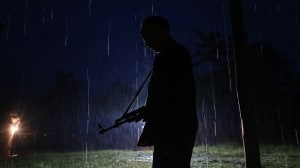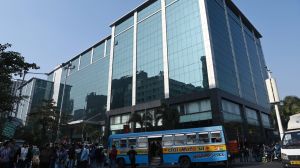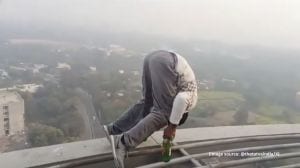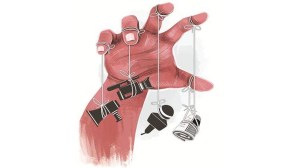Few steps forward, long road ahead
After three intense months as Prime Minister Tony Blair8217;s special envoy for Iraq, I am returning to London. Jeremy Greenstock will shor...

After three intense months as Prime Minister Tony Blair8217;s special envoy for Iraq, I am returning to London. Jeremy Greenstock will shortly come out to replace me.
It is hard to over-state the scale of the transformation we have embarked on in Iraq. The country was repressed by Saddam for 35 years 8212; three times Hitler8217;s spell in power. It is in a state of trauma as it comes to terms with the fact that hundreds of thousands of its citizens were killed by their own government; and ten times that number driven from their homes.
Iraq is a rich country made poor by a regime that spent one-third of national income on the military, and a large share of the rest on palaces, monuments, ridiculous luxuries and stashes of gold and dollars. The economy is in a mess, with no serious investment in the infrastructure for decades. Iraq went from a Stalinist dictatorship to the blinding sunlight of freedom in just three weeks. No wonder the period since Saddam fell hasn8217;t been smooth.
After a hesitant start, the Coalition and the Iraqi people have made good progress in the last three months.
It may not seem so from the media, but most of the country is now secure 8212; the problems are limited to a small area. We have started to implement the plans to rebuild the police and army. The economy is poised to recover. And the Governing Council is in place as the first stage in returning Iraq to a sovereign government and its rightful place in the United Nations. Most of the mountain remains to be climbed, and the task remains huge. But it is do-able, and we are on course. The Iraqi people and we have assets on our side which will help us succeed.
First, the overwhelming support from Iraqis for Saddam8217;s ousting. Second, the determination of Iraqis to have a representative Government, accountable to the people of Iraq. Third, oil revenue available to the Iraqis to fund services and reconstruction. Fourth, US commitment and generosity, and ever-widening international support.
The progress is real. On security, Udai and Qusay8217;s deaths were greeted with loud and heartfelt celebrations, including in the Sunni towns north of Baghdad where the regime gained much of its support. We are putting the Baathist remnants under sustained pressure. They will carry on with their attacks, and other extremist groups are trying to join them. But these groups don8217;t pose a strategic threat to our presence as they don8217;t have the support of the population. Meanwhile, the new police force is becoming operational, and is being cheered by ordinary Iraqis when it breaks up local gangs or intervenes in street crime.
The economy has already stabilised. Salaries are being paid, including stipends to the ex-military. Food is being distributed. Power and water supplies are being restored. Commerce on the street is lively. There is a strong commitment to economic reform, backed by the World Bank and IMF who see reform as essential for a successful transition. And the political process is underway. The Governing Council is deciding on its leadership and its priorities. It has UN backing, and a fair wind from ordinary Iraqis who want the Council to succeed, even if they remain to be convinced it will. We have to keep up the momentum we now have, so that the end is in sight for all parties. That requires an Iraqi-led timetable for the Constitution, with a commitment by us to hold elections soon after. In my view, we should aim to have a sovereign Iraqi government in place around this time next year. Then the Coalition8217;s role in administering Iraq will be over.
We have a long way still to go. There is a staggering amount of arms in Iraq, and no shortage of people trained in their use. The police force is at 25 per cent of its required strength, and even they are in need of complete re-training. It will take two years to train just the first corps of a new army. Mass communications remain basic. Unemployment is estimated at 60 per cent. Electricity generating capacity needs to be increased by 50 per cent just to meet the present demand, and 150 per cent to meet the requirement of a fully functioning economy.
These tasks can8217;t be addressed quickly. But the CPA under Ambassador Jerry Bremer has plans in place on all fronts. Drift isn8217;t a word in his vocabulary. We may only be at the five-mile mark in this marathon, but the route ahead is mapped out, and the runners know what they have to do.
There will be difficulties: this is not a straightforward task. We face a small number of determined opponents from the former regime who are trying to generate a climate of fear. Iraq8217;s Shia community, over 60 per cent of the population, are recovering from decades of exclusion and repression. The great majority of them are with us, but we have to work to maintain their support. Iraq8217;s neighbours are ambivalent at the changes taking place and the implications for them. And we have to be constantly alive to the danger of getting bogged down.
But after my three months in Baghdad, I am confident that we are now on the right course and that the great majority of the Iraqi people are willing us to succeed. Getting Iraq right will bring huge benefits for democratic forces in the rest of the Islamic world as well as for the Iraqi people. We cannot pull back now. Nor can we afford to get it wrong. If we stick to the plan, stay on our present track, we won8217;t.
The writer is British Prime Minister Tony Blair8217;s special representative to Iraq. He is just concluding his three-month stint, during which he has been at the heart of all the key developments in Iraq
- 01
- 02
- 03
- 04
- 05































